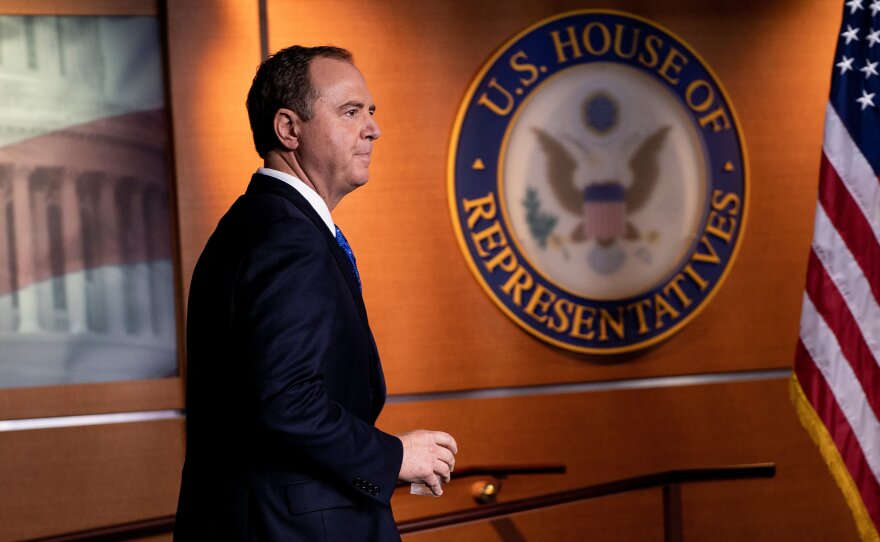Updated at 1:30 p.m. ET
A government whistleblower received information from "multiple" government officials that President Trump "is using the power of his office to solicit interference from a foreign country in the 2020 U.S. election."
An unclassified version of the whistleblower's complaint was made public Thursday by the House intelligence committee. It says that the president's lawyer, Rudolph Giuliani, "is a central figure in this effort. Attorney General [William] Barr appears to be as well."
The complaint centers on Trump's July 25 call with the president of Ukraine, an account of which was released Wednesday by the White House.
The whistleblower says that during the call, Trump "sought to pressure the Ukrainian leader to take actions to help the president's 2020 reelection bid."
The White House memorandum of the call shows that Trump asked Ukrainian President Volodymyr Zelenskiy for "a favor" — to investigate political rival and former Vice President Joe Biden.
According to the whistleblower, White House officials were "deeply disturbed by what had transpired in the phone call."
The complainant said that afterward, "senior White House officials had intervened to lock down all records of the phone call," which the whistleblower says "underscored to me that White House officials understood the gravity of what had transpired in the call."
The whistleblower said this "was not the first time" that a presidential transcript was placed into a "codeword-level system solely for the purpose of protecting politically sensitive — rather than national security sensitive — information."
Translation: White House officials handled materials related to the call differently from the way they usually do, adding additional security to restrict the circle of people who might be able to view them.
That is likely to raise questions about just what other information might be so protected relating to Trump's other conversations with foreign leaders.
President Trump Thursday repeated his characterization of the call with his Ukrainian counterpart as "perfect."
He said Democrats investigation of the call and related activities "shouldn't be allowed. There should be a way of stopping it. Maybe legally through the courts."
Earlier, The White House issued a statement on Thursday portraying the complaint as unremarkable.
"Nothing has changed with the release of this complaint, which is nothing more than a collection of third-hand accounts of events and cobbled-together press clippings — all of which shows nothing improper," the statement said.
At least one Republican lawmaker disagrees. Rep. Will Hurd, R-Texas, who is not running for reelection next year, wrote this on Twitter:
"There is a lot in the whistleblower complaint that is concerning. We need to fully investigate all of the allegations addressed in the letter, and the first step is to talk to the whistleblower."
Will Washington hear from the whistleblower?
Although the House and Senate intelligence committees are negotiating with an attorney for the person, whose identity remains unknown, it isn't clear when Congress may talk with the person.
Acting Director of National Intelligence Joseph Maguire told the House intelligence panel on Thursday that he didn't know the person's identity. He began the hearing by referring to the person as "him" but later said "him or her"
The whistleblower wrote that "multiple officials told me" that Ukrainian leadership was led to believe that a meeting or phone call between Trump and Zelenskiy would be contingent on whether he "showed willingness to 'play ball.'"
A day after the July call, U.S. diplomats met with Zelenskiy and other Ukrainian political officials. The whistleblower said the diplomats "reportedly provided advice to the Ukrainian leadership about how to 'navigate' the demands that the president had made of Mr. Zelenskyy."
The discussions about the actions of State Department or other officials offers other threads for members of Congress to pursue. Lawmakers likely want to hear more about how American diplomats dealt with Zelenskiy or other Ukrainians before or after the phone call with Trump.
Separately, on Aug. 2, Giuliani traveled to Madrid to meet with one of Zelenskiy's advisers in what the whistleblower says multiple U.S. officials characterized as "a direct follow-up" to the president's call with the Ukrainian president "about the 'cases' they had discussed."
Earlier, in May, the complainant reports hearing from "multiple U.S. officials that they were deeply concerned by what they viewed as Mr. Giuliani's circumvention of the national security decision-making processes" as he relayed messages "back and forth between Kyiv and the President."
Copyright 2019 NPR. To see more, visit https://www.npr.org.






